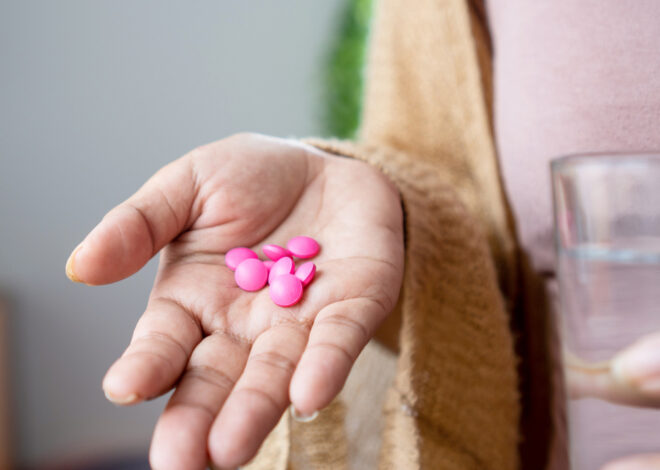
Healthy Habits That Can Help Lower Your High Cholesterol In 30 Days – Health Digest
High cholesterol is a common health concern that affects some 71 million people in the United States. This fatty substance is vital to healthy cell and hormone production, so everyone needs at least some. However, there are two different types of cholesterol: low-density lipoprotein (LDL), often known as “bad” cholesterol, and high-density lipoprotein (HDL), known as “good” cholesterol. The total cholesterol value that appears on your blood report is the combination of the two, plus triglycerides.
There are many factors that can throw cholesterol out of balance. When LDL spikes, it’s important to take appropriate measures to bring that number down. Otherwise, it can build up in the arteries and increase your risk of developing heart disease or stroke. Fortunately, once you’re aware that you need to make a change, there are concrete steps that you can take right away to reverse course and potentially bring down your LDL cholesterol in as little as one month.
However, it takes significant effort and may involve making dramatic lifestyle changes. Your doctor may even recommend that you take a statin medication depending on your risk of developing heart disease, or if you have had a heart attack or a stroke in the past. Even if you’re prescribed a drug, however, your doctor may eventually recommend that you stop taking it if the modifications you make to your eating and exercise habits are successful in improving your cholesterol. Here are some suggestions that could be helpful.
Cut fats from your diet to lower cholesterol
Just as your high cholesterol didn’t develop overnight, it won’t lower overnight either — but changing your diet is the first step towards making a quick difference. The key is to reduce your intake of both saturated and trans fats, both of which can clog the arteries and endanger cardiovascular health. Saturated fat is commonly found in many types of meat and dairy products, fried foods, and baked goods.
Even if those are staples in your diet, there are healthier alternatives that are just as delicious, and that contain low or no saturated or trans fats. Switching to these now can have an immediate effect on the quality of your diet as you begin your journey to lower your LDL. Dr. Romit Bhattacharya, MD, who’s both a Mass General Brigham cardiologist and an associate director at the Massachusetts General Hospital Cardiac Lifestyle Program, says this is one of the best ways to see a difference quickly.
“Imagine that you have a leaky tub, and that tub is filled with cholesterol. Nothing can make it drain faster, but you can turn down or turn off the faucet to add less cholesterol,” he analogizes. He recommends swapping butter (which is “essentially pure saturated fat,” he says) for olive or avocado oil, switching to no-fat dairy, and eating lean protein instead of red meat, and adds that fiber is key, as bulking up on this can help you avoid overeating foods that drive up cholesterol.
Lower cholesterol by starting an exercise program
Regular movement is vital to your health and wellbeing. It plays an especially important role in elevating the HDL cholesterol that protects you from heart disease. It can also reduce damaging triglycerides, a type of fat that can increase your risk of developing type 2 diabetes or experiencing a stroke or a heart attack. Emeritus professor Dr. Robert H. Eckel, MD of the University of Colorado School of Medicine, tells Everyday Health, “By losing fat and building muscle, your numbers can really improve.”
That’s promising news, but what kind of exercise is most effective? Any type of workout can be helpful, according to Dr. Ryan Gindi, MD, who’s a cardiologist at Henry Ford Health. “Moderate to high-intensity exercise helps get your heart pumping and your blood circulating. This can lower your high cholesterol and your risk for heart disease.” The American Heart Association recommends that people work out for at least 150 minutes each week to reap cardiovascular benefits.
In addition to aerobic exercise, adding strength training can also be advantageous. A 2014 study in Sports Medicine found a link between the two, with the findings revealing “acute changes in the lipid profile following different intensities of resistance training.” As with any exercise program, it’s important to consult with your medical provider before getting started. Starting slow is key if you currently abide by a more sedentary lifestyle, and performing low-impact workouts in the beginning can help you build your endurance and strength.
Maintaining a healthy weight can help stabilize cholesterol levels
Carrying extra weight can increase cholesterol, according to 2023 research published in the Journal of Lipid Research. The study found that the LDL among those affected by obesity may behave differently in the body, thus worsening the effects of this “bad” cholesterol. However, losing weight can be a challenge, especially when it’s associated with slower metabolism that naturally occurs over time.
That’s why it may take a trial-and-error approach to see visible weight loss results. The simplest method is to begin monitoring caloric and fat intake, and beginning an exercise program. Attempting to lose weight too fast can actually backfire, though, as it can slow your metabolism. Dr. Marcio Griebeler, MD, tells Cleveland Clinic, “When you lose weight too quickly, your body slows down its calorie-burning process. That is your body’s way of trying to ensure you don’t starve. You might lose a good amount of weight right away, but your metabolism quickly goes into survival mode.”
Even though medical professionals don’t recommend this method of weight loss, the good news is that the benefits begin right away when you start swapping bad habits for good ones. That includes adding even just a few minutes of exercise to your day and swapping high-fat foods for lower-fat alternatives. With this concentrated effort will come a reduction in weight, and, according to research, losing between 5% and 10% of your starting weight could lower your LDL and total cholesterol levels.
Cut out alcohol to start lowering cholesterol
It may surprise some, but drinking alcohol could cause LDL levels to rise. For many, that may fly in the face of popular guidance to drink the occasional glass of red wine to reap the rewards of resveratrol. Per Mayo Clinic, this natural antioxidant has been shown to increase HDL levels and “might” lower LDL cholesterol. Plus, alcohol itself doesn’t have any cholesterol.
Some research, though, suggests the opposite — and some doctors agree that it may not be as beneficial as is widely stated. “Though red wine does have a potent antioxidant called resveratrol, which helps heart health, to get the proper dose for heart health (which is about 500 milligrams), you would have to drink 40 liters of wine a day to get the same benefit as a good resveratrol supplement,” says interventional cardiologist Dr. Sanjay Bhojraj, MD, to Checkup by SingleCare. So while moderate consumption may offer some benefits, overindulging in alcohol is not a wise choice for those who hope it will regulate their cholesterol.
Drinking too much alcohol may even have the opposite effect on cholesterol. According to the Cleveland Clinic, excessive consumption has been linked to elevated levels of both LDL cholesterol and triglycerides. Over time, heavy drinking can also contribute to liver damage, which in turn can disrupt your body’s ability to regulate cholesterol. The bottom line, according to Dr. Leslie Cho, MD: “You certainly shouldn’t take up alcohol to lower your cholesterol risk.”
Control stress levels to handle high cholesterol
Stress can take its toll on the body, driving up your heart rate and making difficult situations feel more distressing. Unfortunately, elevated stress levels can also affect your cholesterol. That’s because stress fuels two key hormones in the body: adrenaline (your “fight or flight” response, which is heightened during moments of perceived turmoil or difficulty), and cortisol. Per WebMD, increased cortisol levels can lead to increased LDL levels. Dr. Eric Ascher, DO, who practices family medicine at Lenox Hill Hospital, tells Health Central, “Stress is known to increase your cortisol, a hormone in your body, and this hormone is known to increase cholesterol.”
Mayo Clinic cardiologist Dr. Stephen Kopecky, MD, confirms to Fox News, “Stress will make your cholesterol go up. Without a doubt, that has been underrecognized.” This cholesterol spike is linked specifically to how your body reacts as a whole to stress. While adrenaline causes that telltale racing heartbeat, cortisol leads to increased blood glucose and, according to Health Central, will even “send extra blood to your brain.”
This reaction leads to hemoconcentration, which causes your blood cholesterol to become more concentrated. This change in the blood’s volume, even if it’s temporary, can cause your cholesterol to go up. Taking immediate steps to manage your stress may be effective as part of an overarching plan to reduce your cholesterol. Luckily, many of the recommendations for reducing LDL — like exercising and eating well — can also help reduce stress levels.
Incorporate more beneficial spices to bring down cholesterol levels
Spices and herbs can do a lot for you, in more ways than one. They’re essential for livening up bland dishes, of course, but some varieties may also be useful if lowering your LDL levels naturally. As you begin adjusting your diet to a more cholesterol-friendly plan, you may want to consider adding both turmeric and garlic to the mix. Both have been shown to have a positive effect.
Research published in Nutrients noted that participants in a 12-week study who supplemented with garlic powder saw a reduction in their LDL. “Garlic has to be consumed after being freshly crushed or chopped (as allicin gets activated) to get its maximum benefits,” suggests Edwina Raj, who heads the Clinical Nutrition and Dietetics department at Aster CMI Hospital, to Happiest Health. “It reduces the blood cholesterol, especially the triglyceride levels which fall under the bad cholesterol category and also lowers blood pressure.”
Turmeric, known as a potent anti-inflammatory, may also be beneficial. Its active compound, curcumin, offers a variety of benefits, contributing to the spice’s many purported health benefits. Lisa Young, PhD, who is an adjunct nutrition professor at New York University, explained to USA Today that turmeric “may also improve heart health by reducing bad cholesterol while increasing good cholesterol.” Adding any of these spices and herbs to your meals can’t hurt in your journey to lower LDL levels.
Quit smoking cigarettes to bring cholesterol levels down
People may not realize that smoking may have just as much of an effect on their cholesterol as their lungs. When you smoke, damaging chemicals enter the bloodstream and affect the heart and circulatory systems. Among those is carbon monoxide, a damaging gas that reduces oxygen content in the blood. This forces the heart to work harder than normal to deliver oxygen to tissues, placing strain on the cardiovascular system as a result.
Per Healthline, that strain increases because smoking also lowers HDL levels, in turn elevating LDL and leading to the formation of arterial plaque deposits. This can put smokers at increased risk of having a heart attack or stroke. Smoking essentially accelerates the development of those deposits, leading the arteries to harden and narrow much faster than they might otherwise. Explains Dr. Joshua Septimus, MD, an associate professor of clinical medicine and medical director at Houston Methodist Primary Care Group Same Day Clinics, “Smoking causes inflammation and damage to your blood vessels, leading to unstable cholesterol plaque and, ultimately, increases your risk of plaque rupture.”
Luckily, it’s not too late to quit smoking if you’re committed to reducing your cholesterol. Starting today means that within the month, you’ll reduce some of the strain on your cardiovascular system and improve your body’s ability to clear some of that excess LDL. Coupled with other positive habits, this can reduce your risk of further heart and vessel damage and support better overall health.
Ask your doctor about cholesterol-lowering medication
Depending on your cholesterol levels, it may be necessary to get started on a prescription medication to begin the process of bringing down your LDL. Doctors may suggest this if you’ve had a heart attack or a stroke, or if you are diabetic or otherwise at significant risk of experiencing one of these events. Per Mayo Clinic, people with especially high levels of LDL (190 milligrams/deciliter or greater) may also need to take a statin to manage their cholesterol.
Statins are very effective, potentially reducing cholesterol by 30% to 50% (via Yale Medicine). According to WebMD, those results are impressive: LDL is reduced by at least 50%, while HDL is increased by as much as 15%. Plus, they work relatively quickly, producing results anywhere from two to four weeks from the first dose.
However, warn doctors, it’s not enough just to take this prescription medication. While your labs may start to tell a different story, it’s important to be vigilant about those lifestyle habits, like eating better. “When you take a statin,” says Dr. Stephen Kopecky, MD, a cardiologist at Mayo Clinic, “your numbers look better, your LDL … looks better, but your cardiac events don’t reduce. A pill doesn’t take the place of a healthy lifestyle. It has to be in addition to it.”


